BSIC: Strategy in Africa
BSIC Bank (Banque Sahelo Saharienne Pour l`Investissement et le Commerce)
BSIC Bank is a regional bank in Africa and it has 14 affiliates in different countries in Africa. Four of them are Anglophone-Arabic affiliates and 10 are Francophone affiliates. The main currency of the bank is Euro. The authorised capital is about 750 million Euro. BSIC Bank is preparing to change its strategy and consolidate its commercial affiliates and start to do development banking through the head office.
Interview with BSIC Bank (Banque Sahelo Saharienne Pour l`Investissement et le Commerce)
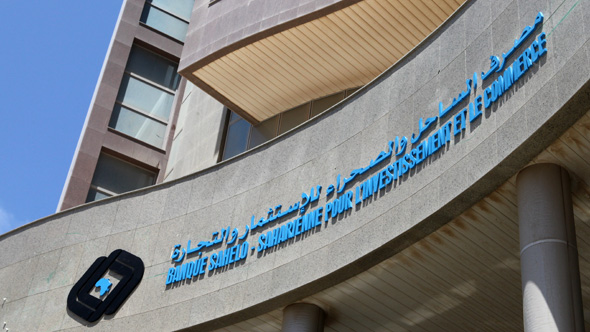
BSIC Bank (Banque Sahelo Saharienne Pour l`Investissement et le Commerce) is present in Libya, Sudan, Ghana, Gambia – that makes 4 affiliates in English-speaking African countries.
As for our online presence, we are currently preparing a website for the whole group, which will contain links to our affiliates.
Dr. Mustafa A. ABUHMAIRA, Head of Banking Operation Department:
First of all, I want to introduce myself; I am Dr. Abuhmaira, the current director of zone 2 which directs four affiliates in Libya, Sudan, Ghana and Gambia. We also have an insurance company in Libya called Qafela Insurance Company and we also a construction company in Sudan called Sahara Company.
BSIC Bank is called Sahelo Saharienne Bank. This bank currently acts as a commercial bank, but I think our main aim is to become a development bank. We are planning to transform our main actions from commercial banking to development banking in the near future.
BSIC Bank has 14 affiliates in different countries in Africa. Four of them are Anglophone-Arabic affiliates and 10 are Francophone affiliates. The main currency of our bank is Euro. Our authorised capital is about 750 million Euro. The paid capital is about 300-380 million Euro and the subscribed capital is 500 million Euro.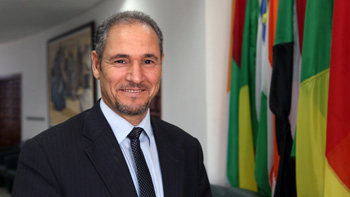
Mr. Hervé CAPO-CHICHI:
I will talk a bit about the francophone branches. We currently have around 10 affiliates: in alphabetic order we have affiliates in Benin, Burkina, Ivory Coast, Guinea, Mali, Niger, Senegal, Republic of Chad and Togo. These affiliates are all operational banks and are mostly working in commercial banking. The capital of these different affiliates is held and controlled mainly by the head offices. The activities of these affiliates comprise of universal banking activities. They carry out common banking activities like lending credit, financing for commerce and also for industry which is in the early stages at the moment. These are the most common activities in the area: commerce, as well as agriculture and also investment. I can also say that these different affiliates are controlled by the head office. There is a department which is in charge of supervising these affiliates. Currently we need to recapitalise two of our affiliates.
In terms of our group’s strategy, the bank has until now mainly financed the commercial sector; this was the most common activity of the bank. However, at the meeting between the bank and the heads of state in N’Djamena, Chad, we were directed to commit to investing in the development of these member states.
So in terms of this new orientation, the bank is at the moment trying to put into place actions to increase its capital or to mobilise new resources in order to be able to achieve our objectives. This is the dynamic that we are in at the moment; we have made a lot of arrangements to achieve this goal. This new focus is very important to the bank.
Mr. Mohamed Khaled SHALBEK, Head of the Operations Department:
My name is Khaled Shalbek; I am the head of the operations department. I’m not sure what I can add to our discussion, as the operations department is internal…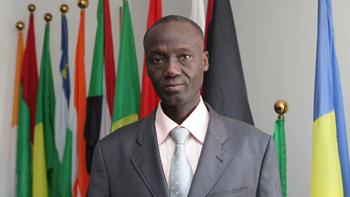
What are some of the challenges that the bank faces internally?
Mr. Mohamed Khaled SHALBEK:
There aren’t any challenges; this is normal work you know. We act to follow our corresponding bank accounts.
What is your strategy for the internal development of the BSIC Bank?
Mr. Mohamed Khaled SHALBEK:
I don’t think I can answer this question.
Mr. Anis GUERMAZI, Manager of the Accounting Department:
The operations department is a unique department because in the past 13 years we have accessed our work for the implementation of our affiliates. Now we have to change our strategy and consolidate our commercial affiliates and start to do development banking through the head office. So the operations department is preparing this job to achieve some financing from the head office. However for the moment they are managing our position with correspondence, covering the position of our affiliates, and preparing the accounting scheme and everything necessary for the development business.
Mr. Mohamed Khaled SHALBEK:
We don’t deal with the public.
Dr. Mustafa A. ABUHMAIRA:
Also, I can add something. BSIC Bank is a regional bank; it is not a local bank. The regional bank controls the affiliates outside of Libya, so here in Libya, BSIC Bank, as a head office, can act as an offshore bank. We can’t deal with the local currency.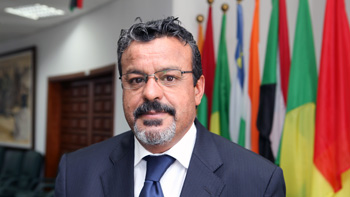
Mr. Anis GUERMAZI:
Personally I was not aware that we were going to communicate this information in such a quick manner, but what I propose for this kind of information that has to do with accounts etc. that should be very precise, is that we are going to try to prepare some figures and I will try to send them to you. I will also try to send you a complementary document with the information to do with what my colleagues have just presented to you. It could be interesting as they have presented general information concerning our affiliates. It would be good for you to have the date the affiliates were created, the number of agencies, employees, the total assets and liabilities etc. the key figures concerning these agencies.
Would you be able to describe the vision that you have for the development of the region?
Mr. Anis GUERMAZI:
To say that we are going to develop the region is going a bit too far. We are going to try to contribute to the development of the region. This is one of the tasks that were assigned to us by our shareholders, which are from 13 different African countries. Currently we have 14 shareholders.
As Mr. Capo-Chichi has said, in the first 12 or13 years we were mostly acting as a commercial bank. Now we have been seriously asked to focus on development banking and we are at the moment talking to strategic and financial partners to be able to change the orientation of this bank, whilst consolidating the assets we have on our affiliate network that we have previously mentioned.
In terms of strategy; we have to act, we don’t have a choice. One of the missions assigned to us was the fight against poverty. 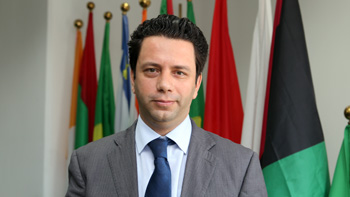 The bank authorities have already decided to create a fund to guarantee the financing for investments and a fund for the fight against poverty. Due to a lack of resources these funds are not yet in place but as I said earlier we are getting stronger and we are looking for strategic and financial partners.
The bank authorities have already decided to create a fund to guarantee the financing for investments and a fund for the fight against poverty. Due to a lack of resources these funds are not yet in place but as I said earlier we are getting stronger and we are looking for strategic and financial partners.
Do you mean international partners or partners from the countries that you operate in?
Mr. Anis GUERMAZI:
No strategic partners could be international, as is the case with other development banks and financial partners would be funding agencies.
Where do you see opportunities in the region for financing these projects?
Mr. Anis GUERMAZI:
The region, in which we operate in, is very consumerist and has many needs in terms of development projects. The opportunities are there and as I said we are in discussions with partners who I prefer not to mention now, who have more experience in the development sector. We believe that the future for this sector is in this region of the world more than anywhere else. Now the challenge is finding the resources. As you know our shareholders are from African countries and so it is not that easy to find the funds in this region as opposed to on the international market. This is our challenge. For the last 4 months we have been doing enormous amounts of research regarding the challenges and the solutions required to succeed in this new path of development banking.
We could also add that since we have taken on board this new role and since the summit in N’Djamena in January, we have been preparing a seminar that will involve our partners to lead discussions on elements concerning the development of methods of financing, the role of BSIC, the challenges and solutions, and also the economic integration of the CEN-SAD countries. We are in the process of carrying out this research. We will be able to send you more details soon. There is a committee that has been set up do deal with this kind of communications.
Dr. Mustafa A. ABUHMAIRA:
I only want to add that our bank was established in 1999, our bank was founded about 14 years ago and so is still a young bank. I think we need a lot of time to become familiar with our big strategy which is for development banking. As you know this requires a lot of experience in this field and that is what we are looking for in the short term because we are changing our main focus from being a commercial bank to being a development bank. I think it needs a lot time to do this and lots of ideas and resources.
Just to clarify, you have many subsidiaries in different countries that provide conventional services such as loans etc. and these are 100% owned by the BSIC Bank which is itself owned by different African states?
Mr. Anis GUERMAZI:
Yes, that’s correct.
Do you want to change your strategy, are you going to sell these banks?
Mr. Anis GUERMAZI:
No, we are looking for a strategic partner that can finance us or give us new resources to push ourselves into the development sector. We want to consolidate the commercial activity and move onto development activity.
Now, what are the alternatives? We are not planning an exit strategy for our commercial affiliates but we can consolidate them. This means that the strategic and financial partner could be a shareholder from the holding company just as much as they could be a new addition to the affiliate. Therefore there are many options and all the alternatives are being studied. I don’t think we can comment much more than that. The decision has not yet been made and the options are still being looked into.